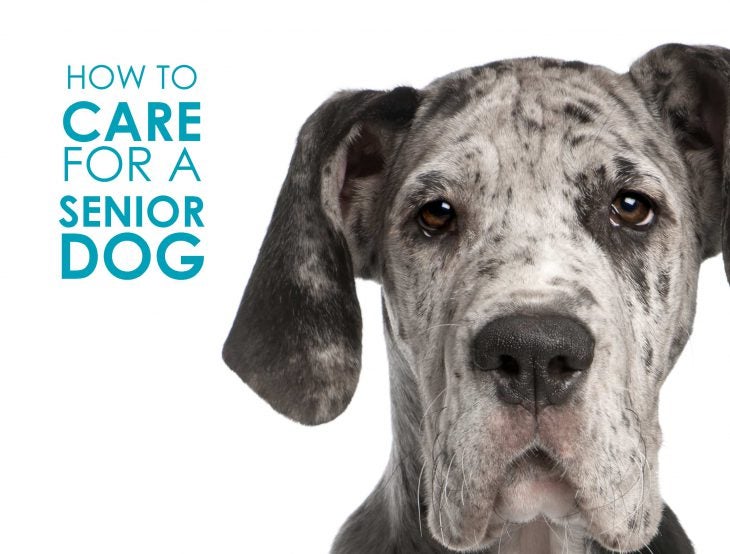Lately, you’ve noticed your once vibrant and energetic dog is not acting as spry as it used to. When you come home from work, it doesn’t leap off the couch and jump up and down when you open the door. Rather, it looks up from the couch as if to recognize you and then it goes back to napping. Or if does get off the couch, your four-legged companion ambles over as if in pain. What’s wrong? Chances are if your dog is five years or older, it is entering its senior years.
When are dogs considered seniors?
The breed and size of the dog is what typically determines when a dog transitions from adult to senior. Large breed dogs tend to age faster than smaller breeds. Large dogs such as Irish Wolfhounds, Mastiffs, and Great Danes typically enter their senior years at around five years of age. Medium breed dogs such as Border Collies, Basset Hounds, and American Pitbull Terriers transition to senior citizen status at around eight years of age. Small dogs such as Chihuahuas, Italian Greyhounds and Toy Poodles usually don’t enter their golden years until they reach eight to ten years of age.
How can I tell if my dog is starting to age?
Signs of aging in dogs are subtle. You may notice that your dog is not as eager to play as it used to. Your four-legged companion might have difficulties climbing stairs or refuse to climb them. It might not respond to your voice commands due to hearing loss. Or it might not respond quickly to visual cues due to vision loss. Other signs of aging include incontinence, gray hairs on the chest, top of head and muzzle. Behavioral signs of aging include becoming more aggressive, less social, a loss of interest in playing or eating.
What types of health concerns will a senior dog have?
As your pet enters its golden years, it will most likely exhibit some of the following health issues: obesity, dental disease, hip and joint problems, arthritis, kidney disease, diabetes, heart failure, and cancer. Due to a dog’s aging process, these health problems are unavoidable for the most part. The key is to ease your dog’s suffering by mitigating the symptoms. Your veterinarian will be able to provide you with the best course of action for treating each condition.
How do I care for my senior dog?
Trips to the Veterinarians – “An ounce of prevention is worth a pound of cure.” Taking your dog to the veterinarian for annual physicals is a good way to detect and address any health issues early on.
Weight Management Dog Food – As your dog ages, it will become less active which will lead to obesity. Therefore, you will most likely need to put your dog on a low-calorie diet. You might also limit your dog’s treat consumption.
Purina Pro Plan Veterinary Diets OM Overweight Management Formula Adult Dog Food beneficial in the management of obesity while meeting the nutritional needs of your pet.
Prescription diet for canine weight loss and weight management is a clinical nutrition especially formulated to reduce a dog’s body fat by 22% in two months, while keeping your pet satisfied.
Specialty Diets Dog Food – Based on your pooch’s health issues, you might want to consider giving it food that can address specific medical conditions.
Blue Buffalo Wilderness Grain Free Chicken Recipe Senior Dog Food is a grain-free protein-rich food that contains more of the delicious chicken your senior dog loves plus the nutrition they need, including LifeSource Bits, which are special kibbles designed by holistic veterinarians and animal nutritionists. They contain a precise blend of nutrients and antioxidants selected to help maintain the health of your senior dog.
Purina JM Joint Mobility Canine Formula has been formulated to provide complete and balanced nutrition for dogs with arthritis. It centers on reducing excess body weight and providing nutrients with anti-inflammatory characteristics.
Supplements for Dogs – As your dog ages it might become deficient in certain vitamins and minerals. Adding supplements to your dog’s diet can help it maintain sufficient levels to stay healthy. Ask your veterinarian about which supplements you should give your dog.
VetCrafted Joint Care Soft Chews with MSM for Dogs provides a comprehensive blend of essential minerals and nutrients for your dog’s daily joint needs.
Vetri-Science Cell Advance – Is recommended to support and maintain the immune system and to protect your dog from free radical damage.
Water – Dehydration is a main concern in aging pets. Make sure your dog has plenty of fresh, cool water to keep it properly hydrated.
Exercise – your senior dog might not be up for the vigorous running around and jumping it used to do, but this doesn’t mean it cannot go out and get some exercise. Just be sure to take into account your dog’s health issues when exercising.
In conclusion, a dog’s size and breed will determine at what age a dog transitions from adult to senior. The larger breeds tend to enter their senior years earlier that the smaller breeds. As a dog ages, it starts to suffer hearing and vision loss. In addition, it might start to develop hip and joint problems, kidney diseases, and cancer. Taking your dog to a veterinarian on a regular basis can help detect some of these ailments at an early stage. Changing your senior dog’s food to address specific health issues is highly recommended. Having your senior dog exercise is a good way to help maintain its health. By taking these steps, you will be able increase the quality of life to your senior dog while adding years.





